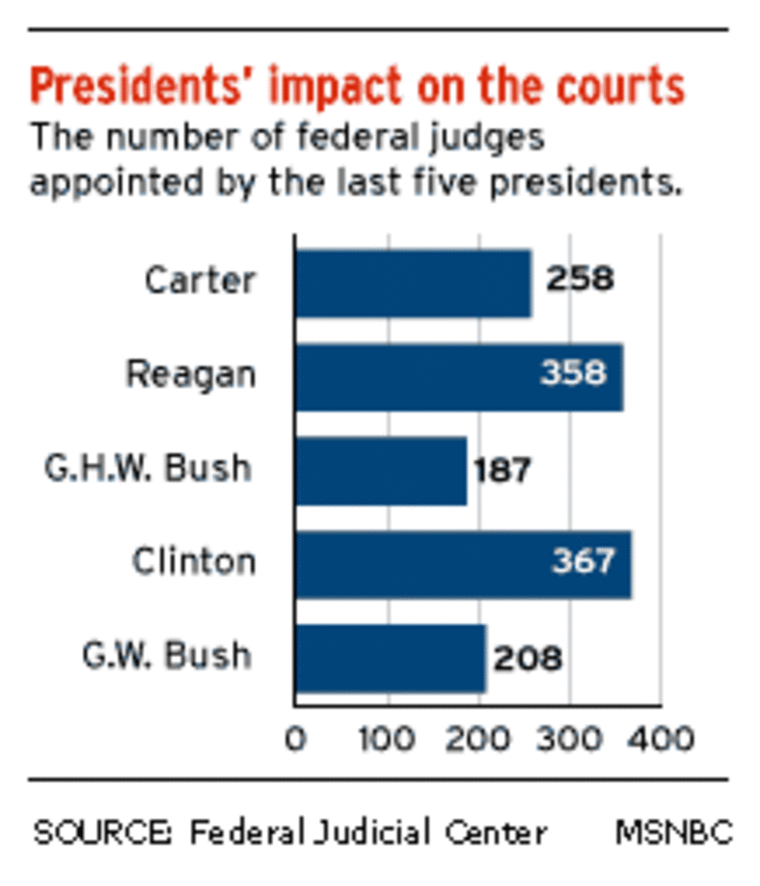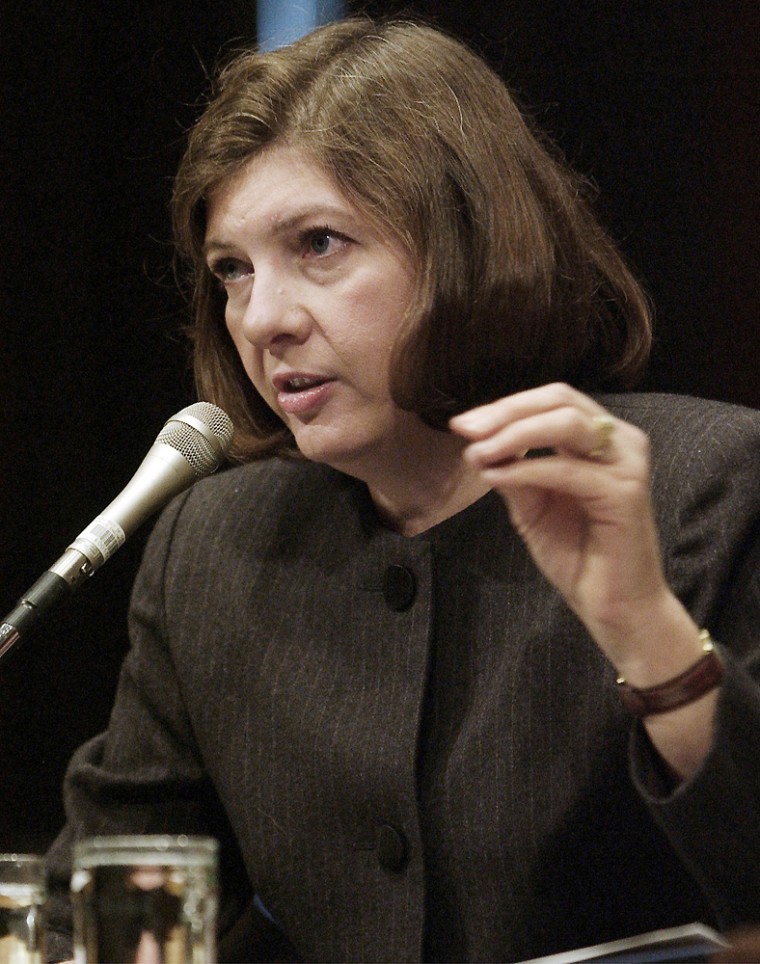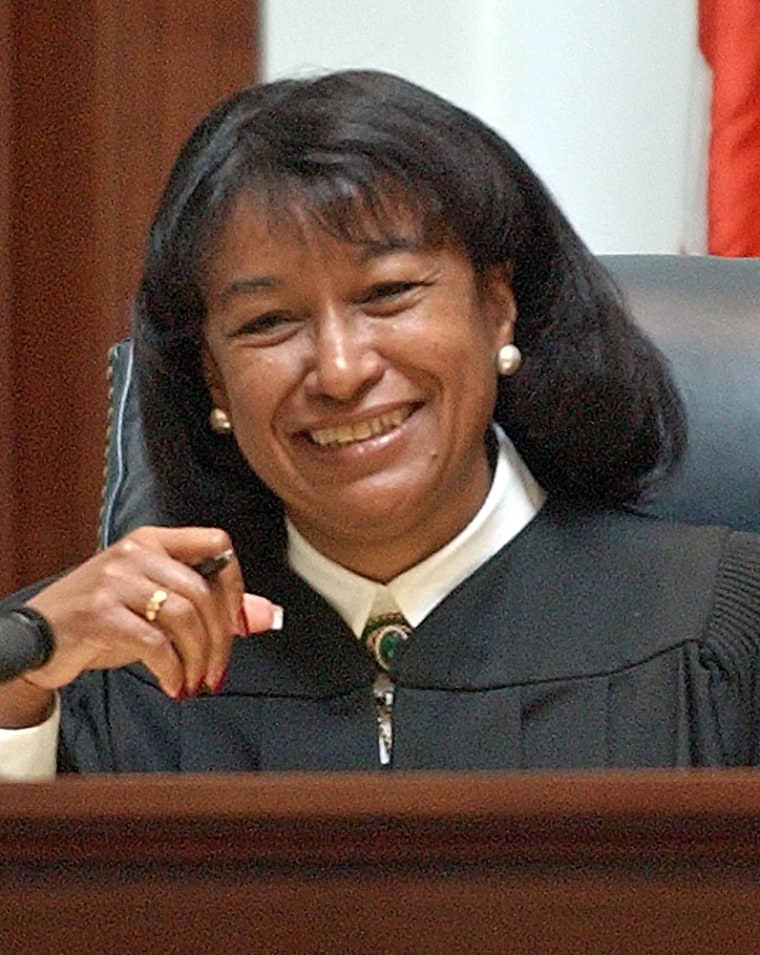Two women stand in the spotlight this week, their nominations to the federal bench the occasion for a historic fight over the president’s ability to select judges and the Senate’s role in voting on nominations.
Appearing on Capitol Hill Tuesday: California Supreme Court Justice Janice Rogers Brown, whom Bush has nominated to the Court of Appeals for the District of Columbia Circuit and Texas Supreme Court Justice Priscilla Owen, whom he has picked for the Court of Appeals for the Fifth Circuit.
Although few senators' minds are likely to be changed at this point, both Brown and Owen will make courtesy calls on senators Tuesday and appear for a photo session with Majority Leader Bill Frist and GOP Whip Mitch McConnell.
Floor debate on their nominations is slated to begin Wednesday. Democratic filibuster threats in 2003 thwarted votes on both women's nominations. Frist is seeking to end a Democratic filibuster of nominees through a rules change. Democrats are fighting to retain the filibuster for a potential Supreme Court showdown this summer.
Sen. Ben Nelson, D-Neb., and Sen. John McCain, R-Ariz., continued their efforts Tuesday to come up with a bipartisan alternative to a rules change. Shortly before noon, McCain emerged from Frist’s office and said the negotiations continued.
As part of a potential deal, McCain said, “a couple or three (of the Bush appeals court nominees) would have to continue to be filibustered and let the others through. The most important thing is the commitment not to filibuster Supreme Court or Appellate Court nominees.” So far, McCain had been unable to get Democrats to agree to that.
A focus on the nominees
Both Brown and Owen worked her way up through the legal and political hierarchy to win a spot on her state’s highest court.
Of the two, Brown is the more flamboyant, with a gift for pungent expression.
During her Senate Judiciary Committee confirmation hearing on Oct. 23, 2003, Democrats skewered her for speeches and rulings in which, Sen. Dick Durbin, D-Ill. said, showed that “your record is that of a conservative judicial activist, plain and simple.”
Sen. Patrick Leahy, D-Vt., told Brown that her nomination was being stymied partly because Republicans had blocked two of President Clinton's nominees to the D.C. Circuit, Elena Kagan and Allen Snyder, and partly because she had no background in dealing with federal agencies. Half of the D.C. Circuit's caseload comes from appeals of decisions by federal regulatory agencies.
Brown denies ideological bent
“I am not an ideologue of any persuasion,” Brown insisted at the hearing. “I really don’t think that the conservative view that I have, which is a kind of classical conservatism, is ideological at all. But I can certainly say that I’m not ideological as a judge.”
Referring to Brown's Democratic critics, former California Gov. Pete Wilson, who appointed her to the state Supreme Court in 1996, said, "This has echoes of the (Clarence) Thomas nomination."
A conservative African-American "is very much anathema to the most liberal of her Democratic critics. They do not like the idea of articulate conservatives, political or judicial, and they particularly are upset by those of color," Wilson said.
Brown’s dissent in a 2002 case, San Remo Hotel v. San Francisco,is high on the list of her well-known opinions.
The state Supreme Court upheld a city ordinance that required hotel owners who converted their properties from long-term residential use to tourist use to pay the city a fee to help low-income people pay for housing.
In her dissent, Brown showed her passion for property rights, arguing that “property ownership is the essential prerequisite of liberty.”
She contended that “private property, already an endangered species in California, is now entirely extinct in San Francisco.”

The ordinance violated both the California constitution and the U.S. Constitution because it was a government seizure of property without just compensation, she argued.
"If a person took my car and asked a ransom for its return, he or she would be guilty of theft,” Brown wrote. “But what if the City, seeking to provide transportation to the poor, orders me to operate an informal carpool, or if I prefer, to buy the City a replacement car?”
Government-approved thievery?
In a phrase that her adversaries have quoted in horror, Brown concluded, “Theft is theft even when the government approves of the thievery. Turning a democracy into a kleptocracy does not enhance the stature of the thieves; it only diminishes the legitimacy of the government.”
In the San Remo Hotel case, Brown castigated elected officials, but in a 1997 decision on abortion she wanted to give deference to elected officials in the California legislature who had enacted a law prohibiting a physician from performing an abortion on a minor without the consent of at least one of the girl’s parents, or permission of a judge.
When her fellow justices struck down the law, Brown vigorously dissented.
“When fundamentally moral and philosophical issues are involved and the questions are fairly debatable, the judgment call belongs to the Legislature,” Brown said.
She condemned the idea that judges had “become the final arbiters of traditional morality in a context in which their view of wisdom cannot be challenged.”
Another oft-cited Brown opus is her majority opinion for the court in a 2000 case, Hi-Voltage Wire Works v. City of San Jose.
She defended Proposition 209, the ballot measure which banned state and local governments from giving preferential treatment in hiring, contracting or education based on race, sex, color, ethnicity, or national origin.
Rejecting racial preferences
By enacting Proposition 209, California voters, she said, had rejected “entitlement based on group representation.” In so doing, California voters were returning to the true intent of the sponsors of the 1964 Civil Rights Act, she argued.
Brown quoted one of that bill’s managers on the Senate floor, Sen. Hubert Humphrey, D- Minn., who told his colleagues that “nothing in the bill would permit any official or court to require any employer or labor union to give preferential treatment to any minority group.”
After voters approved Proposition 209, the city of San Jose adopted a program requiring firms bidding on city projects to have a specific percentage of minority and women subcontractors.
San Jose’s program was unconstitutional, Brown ruled, because by passing Proposition 209, voters intended to “prohibit the kind of preferential treatment accorded by this program.”
Democrats have also condemned Brown for saying in a 2000 speech that Franklin Roosevelt’s New Deal was “the triumph of our own socialist revolution.”
Again the issue for Brown was property rights. She thought New Deal-influenced Supreme Court justices had relegated property rights to “a second-class status” inferior to freedom of speech, voting, and other rights.
Is Owen pro-business?
Democrats have accused the other nominee in the spotlight, Priscilla Owen, who was first nominated in May of 2001, of showing, in Leahy's words, “a bias in favor of government secrecy and business interests, and against the environment, victims of discrimination, and medical malpractice.”
Leahy also said Democrats were blocking a vote on Owen's nomination partly because Republicans had never allowed votes on two of Clinton's nominees to the Fifth Circuit, Jorge Rangel and Enrique Moreno.
At her second confirmation hearing on March 13, 2003, Owen tried to persuade Democrats that sometimes she ruled in favor of individual plaintiffs, sometimes in favor of corporate defendants.

She cited one case in which a teenager who was a passenger in a truck had been injured in an accident.
She ruled against the boy’s family because the plaintiff’s lawyer had filed the suit in Rusk County, rather than in Dallas County, where the accident occurred.
“I think it was pretty clearly forum shopping,” Owen told the Judiciary Committee.
Under Texas law, if a suit is filed in the wrong county the case must be reversed and remanded to the proper court for trial.
Alluding to plaintiffs in such cases, she said, “Your heart does go out to them.… He was totally innocent. But I can’t let that cloud my view or my duty to apply the law clearly and fairly in these cases. I can’t rule for someone simply because they’ve been subject to an injury and they’re an innocent party.”
Most of the ruckus over Owen has focused on her opinions in parental notification cases where minors seek abortions.
Owen conducted a debate with her fellow justices over exactly what the Texas Legislature meant when it passed a statute saying a minor must be "sufficiently well informed to make the decision to have an abortion."
Teenagers seeking abortions
Citing a 1989 U.S. Supreme Court decision which expressed concerns about the psychological consequences for a woman who has an abortion, Owen argued that the Texas court should require a minor to prove that she had gotten counseling “about the emotional and psychological impact she may experience now and later in her life as a result of having an abortion. She should be able to demonstrate to a court that she understands that some women have experienced severe remorse and regret.”
In another parental consent case, Owen dissented from the majority when it ordered a new hearing for a 17-year old girl seeking an abortion without notifying her parents.
The girl had testified that her parents would cut off all contact with her if they found out she’d had an abortion.
If the trial court found her testimony credible and not contradicted, the Texas Supreme Court majority said, then it could not deny her application for an abortion.
But Owen said the trial judge should not be unduly influenced by such testimony.
“Her parents would be within their legal rights to express their disapproval of her conduct by withdrawing further support once she is considered an adult,” Owen said. “I cannot countenance a rule of law that would permit a minor to deceive her parents in order to avoid their expression of disapproval when those acts of disapproval are wholly within the parents' rights.”
